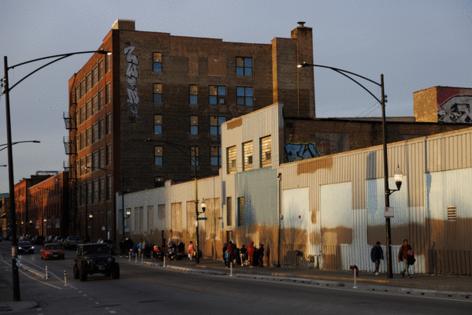City's public health department declares measles outbreak over, according to report
Published in News & Features
CHICAGO — The city Department of Public Health is officially declaring the end of the measles outbreak that began in March and primarily affected migrants in a shelter on the Lower West Side, according to a report released by the department Thursday.
In total, there were 64 measles cases during March and April. The last reported case was April 20 and Thursday marks two full incubation periods for measles — 42 days — having passed without any new cases, the report said.“Chicago … is a city where we welcome between 50 to 60 million people every year. So we must be ready. We must always be ready to go,” said CDPH Commissioner Olusimbo Ige told the Tribune about the outbreak.
Measles spreads through the air when an infected person coughs or sneezes or when a person comes into contact with an infected person’s mucus or saliva, according to state public health information. It is particularly dangerous to babies and young children.
On March 7, public health officials identified the first case of measles in the city since 2019 on the Northwest Side. The next day, officials reported the first positive case in the migrant shelter, where nearly 2,500 people were living in close quarters. It was the city’s largest shelter at the time.This concerned infectious disease experts, who warned that many migrants may be unvaccinated because of a weak public health infrastructure in their countries of origin. Most Chicagoans are vaccinated against the highly contagious disease — which thrives among unvaccinated populations.
Eventually, 57 cases were confirmed at the shelter, city officials reported.
More than 42,000 migrants have been bused and flown by Texas Gov. Greg Abbott to Chicago in about two years from the southern border. Fleeing poverty and violence, they often have acute needs to which the city has struggled to respond.
Before the outbreak, city officials prioritized their shelter and food needs, and after 60 days of their arrival, Ige said they had the opportunity to receive a comprehensive medical examination. “Many people do not show up for their appointment. So that was why there was a gap,” Ige said.
The night of the first detected case, Ige said she and other city health officials mobilized quickly. They went from bed to bed in the shelter, urging roughly 1,000 people who weren’t vaccinated to get their first of two combined measles/mumps/rubella doses. Unvaccinated shelter residents were quarantined and students were told to stay home from school. “This was a battle that was fought,” Ige said.Dozens of public health employees worked with community partners around the clock to have difficult conversations with new arrivals, meticulously verify records, conduct contact tracing and check for symptoms. And 99.6% of those who were eligible received the vaccine, according to Ige. As cases climbed, health officials extended their efforts to the more than 20 shelters then housing migrants, administering over 30,000 doses to date, according to CDPH data. Ige said the city changed its requirements so migrants now receive medical examinations immediately upon arrival as part of the requirements to be placed in a shelter.
____
©2024 Chicago Tribune. Visit at chicagotribune.com. Distributed by Tribune Content Agency, LLC.







Comments